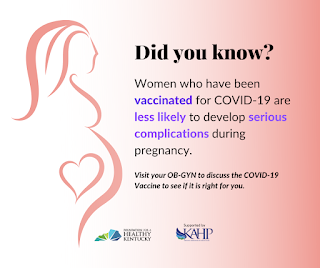New campaign to combat Covid-19 vaccine hesitancy in pregnancy is launched; only 31% of the pregnant are vaccinated

The Foundation for a Healthy Kentucky, with support from the Kentucky Association of Health Plans, has launched a statewide campaign to educate Kentuckians about the risks of Covid-19 during pregnancy and the benefits of getting vaccinated.
“This is not about scaring people, rather having an honest conversation about what Covid-19 can mean for pregnant women and their babies,” Ben Chandler, president and CEO of the foundation, said in a news release. “We hope to spur conversations between patients and their health care providers.”
The campaign asks the question, “What’s right for you?” and encourages people who are pregnant to talk with their obstetrician-gynecologist about their individual situation.
“I think every doctor is going to tell you, based on all of the data that we’ve got, that getting the vaccine is the appropriate and safe response,” Chandler said at a news conference. “In fact, it is tremendously safer than not getting the vaccine. . . . What we know about the vaccinations is that they are safe for the mother, they are safe for the baby. They do not cause infertility. They are safe in every way, shape and form.”
The campaign was launched after the sponsors held focus groups and individual interviews with Kentuckians who were pregnant and said they wanted more information about the potential impact of the virus and how the vaccine works. They also wanted to have a discussion with their doctor about what it all means for them, personally.
“Covid poses unique risks for both mother and child during pregnancy,” Katherine Kington North, director of external affairs for KAHP, said in the release. “We can improve outcomes when we encourage conversations between moms and their healthcare providers. It is critical to have a trusted, real dialogue, not a one-way conversation.”
Studies show unvaccinated pregnant people do not seem to be at a higher risk of contracting Covid-19. However, research shows they are about 40% more likely to develop serious complications during pregnancy if they get the virus, compared to those who are not infected. The Centers for Disease Control and Prevention adds that unvaccinated pregnant people are also at higher risk for pre-term labor, still births, or death.
The CDC says more than 200,000 pregnant women in the U.S. have received a Covid-19 vaccine without any safety or health concerns. The agency also reports that fewer than one-third (31%) of people who are pregnant in the U.S. are vaccinated against Covid-19.
The campaign provides a toolkit that includes materials available for use by health care providers and advocates, including social media graphics and videos, educational resources, and talking points for providers. All of the content has a common message: people who are pregnant or thinking about becoming pregnant should discuss the Covid-19 vaccine with their health care team to decide what is best for them. Download the toolkit here.
It also includes links to the research that supports the need for people who are pregnant to get a Covid-19 vaccine:
- Unvaccinated pregnant women are 15 times more likely to die from Covid-19. [source]
- Unvaccinated pregnant women are 22 times more likely to have a pre-term birth than those who have been vaccinated against Covid-19. [source]
- The risk of still birth among pregnant women with Covid-19 is twice as high compared to uninfected patients. [source]
- Receiving a messenger RNA Covid-19 vaccine does not affect fertility and does not increase the risk of miscarriage or stillbirth. [source]
- Vaccinated and breastfeeding mothers can pass on Covid-19 antibodies, giving their babies passive immunity against the virus for their first six months of life. [source]
“We know the pandemic adds extra layers of concern for expecting mothers,” said Chandler. “We are proud to partner with KAHP to encourage women to ask questions and learn more from reliable sources about Covid-19 vaccines. In the end, we hope to improve the health outcomes of Kentucky moms and their newborns.”